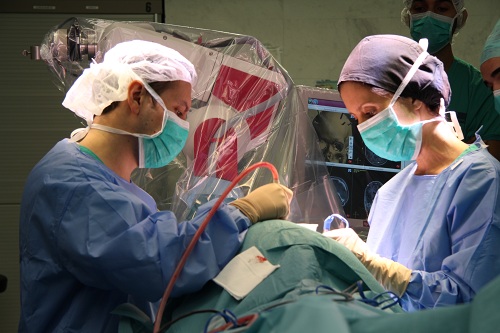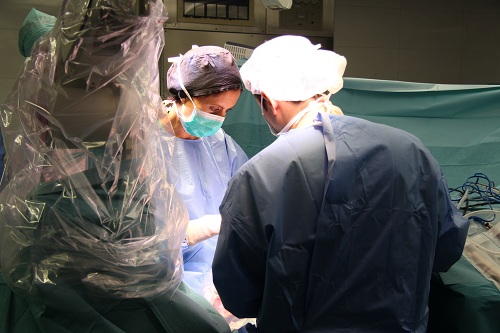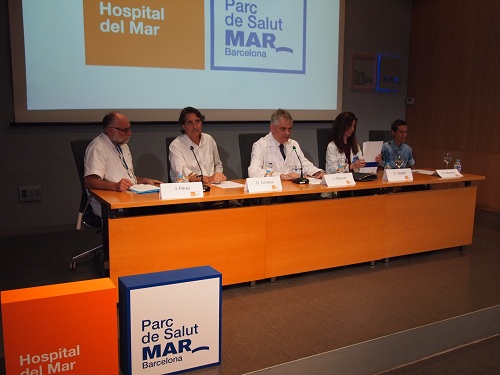
July 12, 2018 -
The centre is a pioneer in Europe in using this type of intervention for treating anorexia nervosa. The project analyses the efficacy and tolerability of this technique. 3 of the 4 cases treated so far have shown a positive response, with no complications either in the surgery or brain stimulation. The operation uses robotic technology, with electrodes being inserted into deep brain areas related to mood, anxiety, and motivation/reward. Neurosurgeons and psychiatrists from the Hospital del Mar are working together on this clinical trial.
Inserting electrodes into deep areas of patients' brains, in other words, using deep brain stimulation, can be effective for treating anorexia nervosa. This technique is being studied by a Hospital del Mar team led by neurosurgeons and psychiatrists from the centre. So far, the operation has been performed on 4 patients. All of them have recovered with no complications either in the surgery or brain stimulation. Treatment response varies according to patient.

The surgery involves placing electrodes in a particular region of the brain, the subcallosal area or the nucleus accumbens, which is chosen according to the characteristics of the patient. To do this, the neurosurgeons use a robot known as ROSA that gives them full control of their location at all times. The selected points in the brain do not stimulate appetite, instead the idea is that stimulating them will improve the functioning of the brain circuits that control mood, anxiety, and the motivation and reward mechanism, and lead to weight gain.
This is a very precise surgery that requires extensive planning and prior work carried out with the help of a specific computer programme. During the operation, the battery that will send the stimulus to the electrodes is also inserted under the patient's skin. The technique is reversible and adjustable, as Dr. Gloria Villalba, the neurosurgeon heading up the project, explains. "The risk involved in the surgery is low, making it acceptable for patients who have a very serious condition and who have no other treatment options. For this reason, we think that it is worth them participating in the study", she states.

This type of operation is aimed at certain patients. Before undergoing surgery, they are selected in collaboration with eating disorder and mental health specialists from the Institut de Trastorns Alimentaris (ITA). They are patients who have been suffering the disorder for more than 10 years, and for whom other conventional treatments have failed. Their weight should situate them at a body mass index of below 16, but more than 13.
Patients with anorexia nervosa commonly suffer secondary psychiatric disorders. As Dr. Víctor Pérez, head of the Psychiatry Service at the hospital and director of the Institute of Neuropsychiatry and Addictions, highlights, this type of eating disorder presents comorbidities, the most common being "depression and obsessive compulsive disorder, and deep brain stimulation has been proven effective for both of these." This technique has long been used as a neurosurgical technique for treating pathologies such as Parkinson's, tremor, and dystonia. It has only been applied to anorexia nervosa in a few cases in Canada and China, but is now being studied in Europe. The Hospital del Mar project is the first on the continent and is funded by a grant from the Spanish Health Research Fund (Fondo de Investigación en Salud) and CIBERSAM from the Ministry of Health. If the results are positive, this technique will be incorporated into the range of services available from the Joint Neurosurgery Service of Hospital del Mar and Hospital de la Santa Creu i Sant Pau .
In 3 of the 4 cases treated so far with this technique, 3 women and one man, there has been a varied, but positive response. The first two patients, operated on a year ago, have already finished the study. At the same time, Dr. Villalba points out that there has also been improvement in the pathologies associated with the anorexia. "In addition to seeing a weight-related response, there has also been a positive response to associated problems in these patients, such as depression, anxiety and obsession." The first patient treated recognises that "through the treatment you learn that the disease does not go away, but you learn to give way, and this leads to improvements not only in weight, but also in mood and anxiety".

Press conference
The third subject, who went under the knife in November 2017, has not yet responded, although it has been demonstrated that it can take up to a year to for this to happen. The last patient, operated on in April, has experienced a very positive evolution. Even so, it is still too early to say whether the surgery has reached the same level of success.
This is an eating disorder characterised by an abnormally low body weight, a distorted perception of the patient's own weight, and an intense and increasing fear. It can cause various health problems including dizziness, tiredness, blood test abnormalities, fragile hair, osteoporosis, and, in women, menstruation can stop. At the same time, it affects sufferers' personal, social, and professional lives and, in extreme cases, leads to the death of the patient.
It is the third most prevalent disease among adolescents, since the age of onset is between 13 and 18. It affects 1 out of every 100 young people between these ages, particularly women (only 5-10% of those affected are men). In Spain, it is estimated that the impact of eating disorders is less than 5% in the teenage population. This includes anorexia, which 0.3% of the female population suffers between the ages of 12 and 21.
Anorexia has the highest mortality and morbidity rates of any mental illness. 30% of cases become chronic and do not respond to treatment, and there is a high suicide rate among patients.
The new Joint Neurosurgery Service of Hospital del Mar and Hospital de la Santa Creu i Sant Pau was set up on March 1st of this year. This initiative aims to take advantage of the expertise in the two centres to create synergies and favour more specific, patient-focused care. The new service covers the needs of more than 800,000 inhabitants of the city of Barcelona (almost half of its population) as well as acting as a reference service over a broader region, for Catalonia and Andorra.
Parc Salut Mar
Passeig Marítim 25-29 Barcelona 08003
See location on Google maps
Phone: 93 248 30 00 · Fax: 93 248 32 54
Information request
© 2006 - 2025 Hospital del Mar · Legal notice and Privacy Police | Cookie Policy | Accessibility